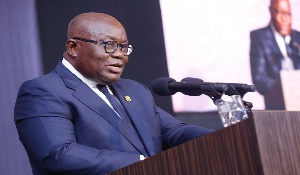President Nana Addo Dankwa Akufo-Addo has stated that the legendary Nelson Rolihlahla Mandela would have endorsed the “Ghana Beyond Aid” project, considering the foreign policy stance he advocated and pursued.
He said Mandela’s conduct of foreign policy reinforced the importance he attached to the independence of action to complete stated goals and would have supported the policy that sought to free the Ghanaian state and economy from dependence and reliance on foreign aid.
President Akufo-Addo said this at a lecture to commemorate the centenary celebration of the birth of Nelson Mandela at the Labadi Beach Hotel in Accra last Wednesday.
It was organised by the government of South Africa on the theme: “Be the legacy”.
The over 30-minute presentation, which dwelt on Mandela’s exemplary life as a good model for the current generation, was interspersed with copious quotations from the myriad of wise sayings by the former South African President.
The President stressed the fact that self-reliance would lead to the construction of a free, prosperous nation as was dreamt of by its founding fathers.
Attendance
In attendance were former President Jerry John Rawlings and his wife, Nana Konadu Agyeman Rawlings; the Vice-President of Liberia, Mrs Howard Taylor; members of the Diplomatic Corps, ministers of state and captains of industry.
The President wondered how Mandela would have reacted to the interventions by foreign diplomats in the national discourse of African states when, with the best of intentions, they advocated constitutional and governance prescriptions for the guidance of the local people.
He stated that he personally frowned on such interference because it was not for diplomats to engage in such moves and expressed the belief that Mandela would have abhorred same.
Touching on the former South African President’s mediation acumen, President Akufo-Addo said Mandela, who was very resolute, was never daunted by the sheer size of the problem that confronted him and quoted one of Mandela’s sayings: “It always seems impossible until it is done.”
Personality cult
The President indicated that although it would not have been out of place for Mandela to have fallen for the numerous praise-singing that characterised his release from prison, he kept his cool and reminded himself to go easy on the praise-singing showered on him and the high expectations because he was human and could also make mistakes.
He added that another wise saying from the legend that underlined his modesty was: “One issue that deeply worried me in prison was the false image that I unwittingly projected to the outside world of being regarded as a saint. I never was one, even on the basis of an earthly definition of a saint as a sinner who keeps on trying.”
Small things
President Akufo-Addo noted again President Mandela’s trademark of extending small courtesies to people at the least opportunity.
He referenced that trait with another of his popular sayings: “The habit of attending to small things and of appreciating small courtesies is one of the important marks of a good person.”
Punctuality
He described Mandela as a man of his word who practised what he preached because for many years he was punctual at work.
For instance, he said Mandela would arrive at the African National Congress (ANC) headquarters first and wait until the arrival of other staff to let him in and was also known for arriving at functions as advertised and “watched with disdain and frustration as officials trickled in”.
President Akufo-Addo added that the African legend always woke up early and had to wait for his bodyguards before embarking on his morning walk.
UN
The United Nations (UN) Resident Coordinator for Ghana, Ms Christine Evans-Klock, said the late South African President was one of the few people whose lives had a great and positive impact on a lot of people in the world and recounted a visit she made to Robben Island, where she was surprised at how he was able to live in a very small cell for that long period.
She added that Mandela’s forgiving nature, which led to the establishment of the Truth and Reconciliation Commission in South Africa after his release from prison, attracted the attention of the UN to set aside July 18, each year as Nelson Mandela Day.
Ms Evans-Klock also quoted copiously from the repertoire of Mandela’s sayings to enrich her speech on poverty, such as: “Poverty is not an accident. Like slavery and apartheid, it is man-made and can be removed by actions of human beings.”
SA Minister
In his address, the South African Minister of International Relations and Cooperation, Dr Lindiwe Sisulu, said Mandela was considered more than the father of the nation because he was a selfless freedom fighter who sought the interest of his people.
She stated that the comments made by Dr Kwame Nkrumah during a conference in Ghana, to the effect that “The independence of Ghana is meaningless until it is linked up to the total liberation of the entire Africa”, resonated with the people of South Africa and gave them hope that they were not alone in the fight to disentangle themselves from the apartheid regime.
She commended President Akufo-Addo for his sterling leadership role and commitment to continental unity.
Performances
South African international musicians, Caiphus Semenya and Lette Mbulu, supported by Ghanaian saxophonists, treated the large gathering to melodious and exciting South African and Ghanaian music.
There was also a musical performance by the ace saxophonist on the Ghanaian musical scene, Steve Bedi.
General News of Friday, 20 July 2018
Source: asempanews.com

















